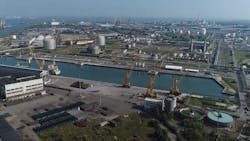Eni SPA has enlisted Saipem SPA to serve as the main contractor for the second-phase expansion to enhance processing flexibility and expand production of renewables-based fuels at subsidiary Enilive SPA’s existing Venice biorefinery at Porto Marghera, Italy.
As part of the €155-million contract, Saipem will deliver engineering, procurement, and construction (EPC) services on the project, which aims to boost the biorefinery’s current production capacity of 400,000 tonnes/year (tpy) to 600,000 tpy, the service provider said on June 24.
Scheduled for startup in 2027, the completed second-phase expansion will also enable the Venice biorefinery to begin its first production of sustainable aviation fuel (SAF), Saipem and Eni said.
This latest EPC contract for Porto Marghera site follows Eni’s earlier awards to Saipem for delivery of the feasibility studies, preliminary detailed engineering works, early procurement services, purchase of critical equipment, and front-end engineering and design (FEED) works for both the Enilive-operated Venice and Livorno biorefineries under a previously signed collaboration agreement with the service provider, according to a Mar. 25 release from Eni.
Confirmed for final investment decision (FID) in 2024, Eni said in its latest 2025 capital markets update to investors that the project to convert its idled 84,000-b/d conventional crude oil refinery in Livorno, Tuscany, on Italy’s northwestern coast, into what will become the country’s third biorefinery is scheduled for startup in 2026 with a nameplate production capacity of 500,000 tpy (OGJ Online, Sept. 10, 2024).
A paced transition
The Venice and Livorno projects are the latest in the Italian operator’s long-term plan to continue conversion of its conventional refineries into renewables-based production centers while retaining strategic optionality around remaining traditional capacity as part of its net-zero journey, Eni said.
The first global operator to convert two of its conventional refineries into biorefineries, Eni first began producing biofuels in 2014 by processing vegetable oils and biomass waste into renewable diesel following conversion of the Venice refinery, followed by transformation of the 105,000-b/d Gela refinery on the southern coast of Sicily in 2019.
In its Feb. 27 capital markets update, Eni also revealed its plans to take FID this year on additional conversion projects at its existing 180,000-b/d Sannazzaro de' Burgondi conventional refinery in Italy’s province of Pavia and the Priolo Gargallo steam-cracking plant in eastern Sicily.
If approved, the Enilive-operated Sannazzaro biorefinery would begin producing 550,000 tpy of renewable fuels by December 2027, with subsidiary Versalis SPA’s planned Priolo biorefinery to follow by yearend 2028 at a nameplate production capacity of 500,000 tpy, Eni said.
Forming part of Eni's broader decarbonization strategy to achieve carbon neutrality by 2050 in line with the global energy transition, the projects collectively seek to increase Enilive’s current 1.65-million tpy systemwide biorefining capacity to more than 5 million tpy by 2030.
About the Author
Robert Brelsford
Downstream Editor
Robert Brelsford joined Oil & Gas Journal in October 2013 as downstream technology editor after 8 years as a crude oil price and news reporter on spot crude transactions at the US Gulf Coast, West Coast, Canadian, and Latin American markets. He holds a BA (2000) in English from Rice University and an MS (2003) in education and social policy from Northwestern University.

